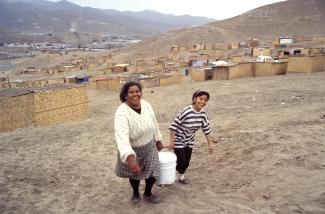Local government
Water investments in Peru

Participation in democratic decision-making usually amounts to electing officials. Once elected, they alone decide on public budgets, but the people feel the impact. Participatory budgeting is a way to further democratise decisions on public expenditure, especially concerning public amenities like water provision, schools or health care at the local level (see interview with Giovanni Allegretti in D+C/E+Z 2013/03, p. 119 ff.). Right from the start, citizens are involved in the selection of investment projects.
The international model is Porto Alegre in Brazil. The city started participatory budgeting in 1989. According to the World Bank, the approach has improved water and sanitation there.
But does participatory budgeting generally benefit the poor? A recent study that was published by the Inter-American Development Bank (IDB) shows that this is not always the case. The authors consider the case of Peru, where participatory budgeting (PB) has been mandatory for every sub-national government since 2004. The idea was to include politically and economically weak strata of society in decision making. In 2009, roughly a third of the investment budget at the municipal level in Peru was decided in PB processes, according to the IDB experts.
The authors name three ways in which PB directly affects the quality of public service:
- The people can express their opinion on municipal matters better, and this leads to more transparency,
- there is more investment in basic services, and
- such services and their quality are better monitored.
Nonetheless, the study shows that in Peru, PB does not have any positive effect on water and sanitation so far. More participation in PB is somewhat connected to better service quality, but not at all to the extension of the services. This means that, at least concerning the water sector, poor people do not benefit much from PB. They often live far away from the water pipes and are in urgent need of water-service extension. However, they tend not to take part in PB, so they have little say in the allocation of funds.
The authors list several reasons why PB is not having a positive effect. For instance, Peru’s mayors are not obliged to submit a minimum share of investment decisions to PB. How much money is allocated by PB is up to each mayor. Interest groups can exert pressure and marginalise the citizens in the PB process. It matters that there are several actors in Peru’s water and sanitation sector, including the central, regional and local levels of government, the private sector and public utilities, and all are pursuing their own specific interests.
According to the authors, technical resources of the municipalities are also a problem. The technical teams set up by the local authorities in order to work on PB projects are often simple neighbourhood organisations without any experience in project development and management, least of all big-scale projects.
In principle, the authors argue that participatory budgeting in the water and sanitation sector does have the positive effects as seen, for instance, in Porto Alegre in Brazil. The reasons for failure in Peru, they indicate, are poorly designed rules and technical bottlenecks. They suggest a number of measures to improve things, like information campaigns and empowerment of social organisations.








